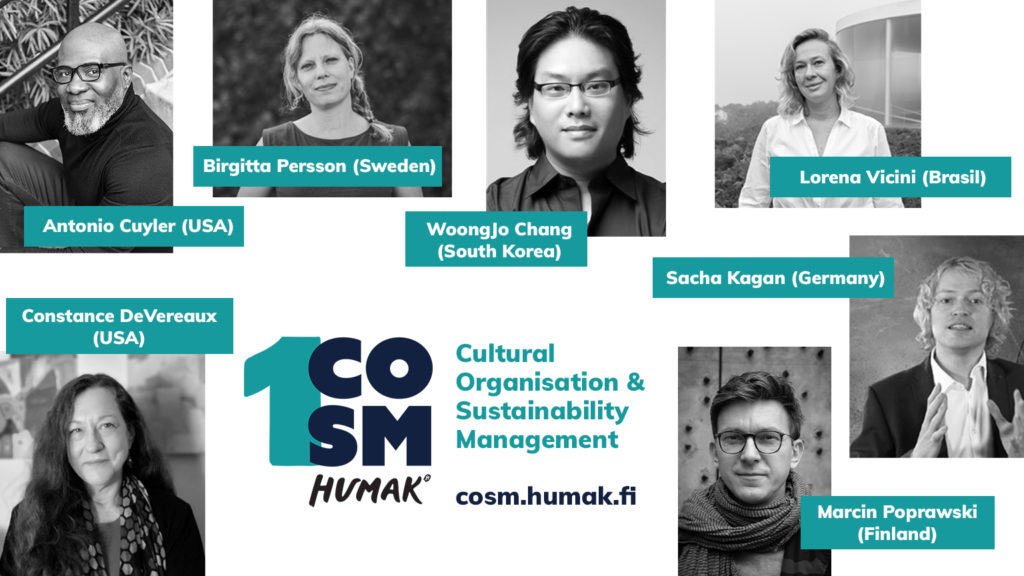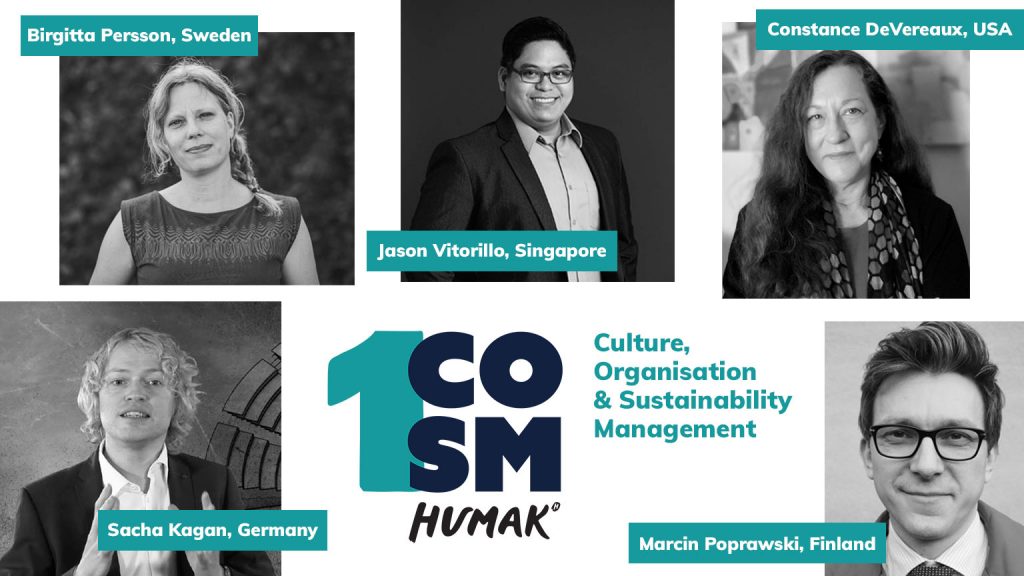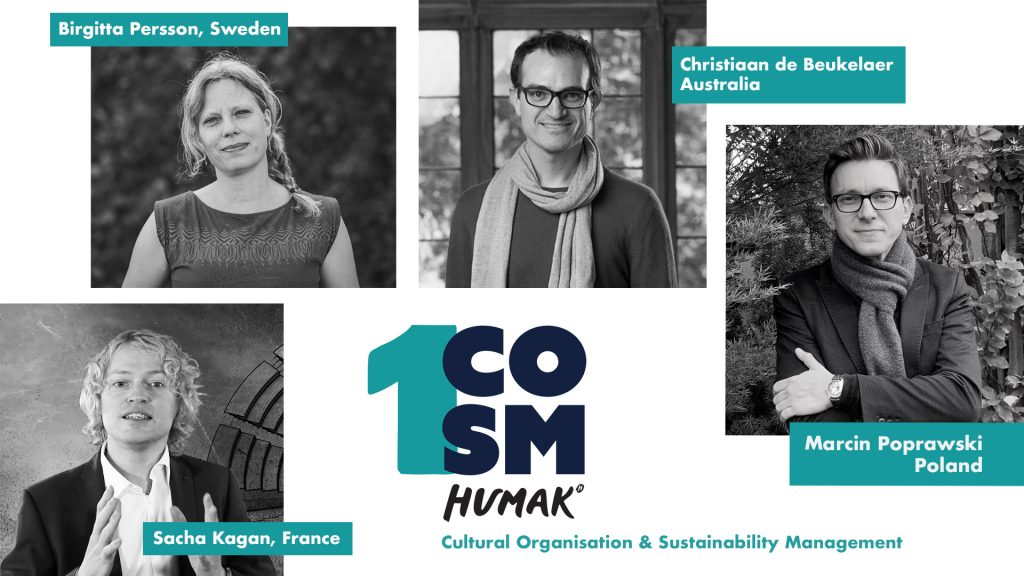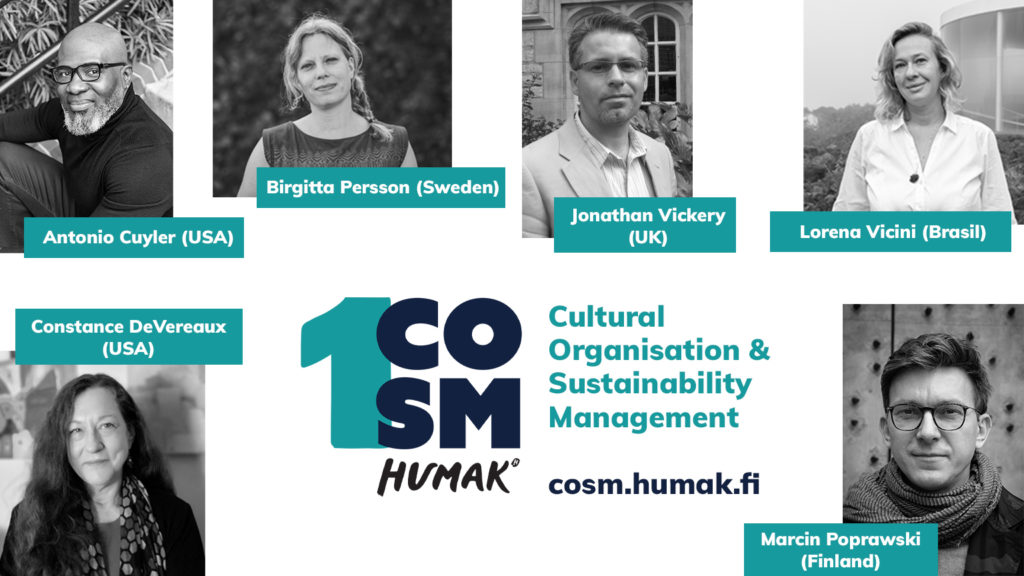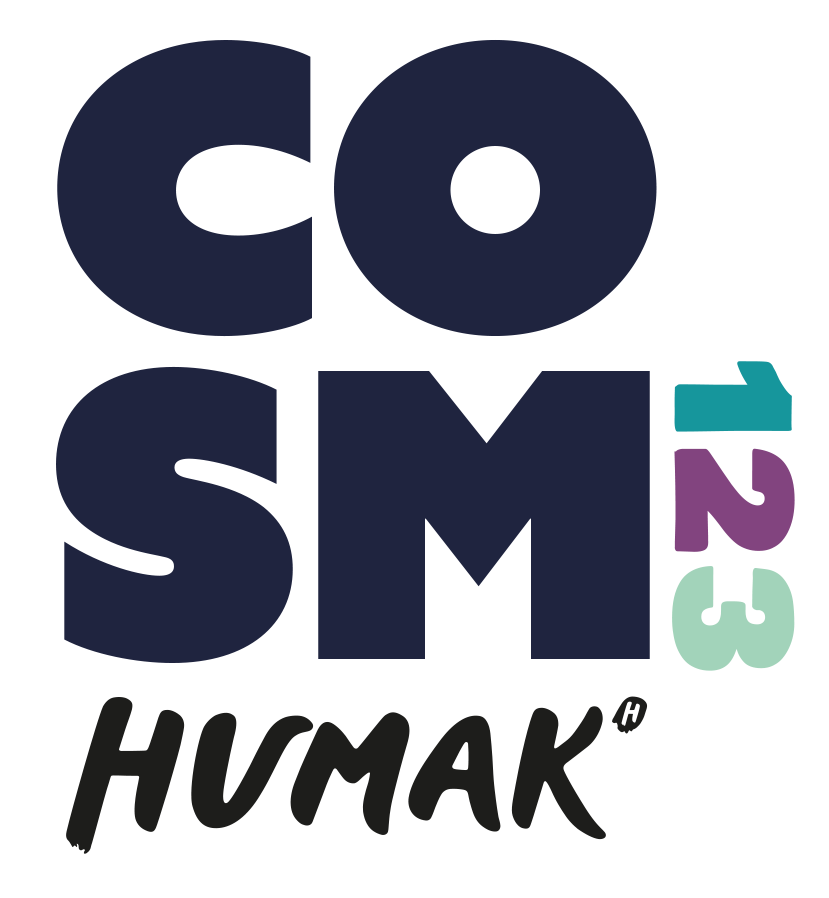COSM 1 – Cultural Organisation & Sustainability Management is a 5 ECTS MA level course that provides an international and cross-disciplinary perspective on the sustainability values oriented cultural management applied to cultural, creative, heritage and art organization of different size and type. It is the introductory course and the actual conceptual frame of the whole COSM series of three courses (15 ECTS). This is the revised version of the course that went through the pilot stage of testing in Spring 2021 and was highly evaluated by all participants. As a blended learning process, it comprises of: (a) 4 sessions with international and Finnish guest lecturers, facilitated by the host lecturer of the course, Dr Marcin Poprawski; (b) the access to the interactive Hoodle platform with the content to be studied by participants. The platform gives access to literature files, video materials, and digital sources. Webinars 1 and 4 (give hybrid learning options) are organised in the classroom of Humak UAS in Helsinki and broadcasted life online as a zoom session. Webinars 2 and 3 are entirely online zoom webinars.
The sixth edition of COSM courses will start 12.9.2023 (with the registration deadline of 2.9.2023 for the first course). You can register on Humak University Open University Web Shop. Contact Us to get more information!
Amongst carefully selected and invited experts and guest lecturers who shared their experience and knowledge through COSM 1 were inspiring individuals from Finland, Sweden, Brazil the UK and Korea. They represent experience of work in Asia, Europe, and North America
Guest lecturers (6th edition):
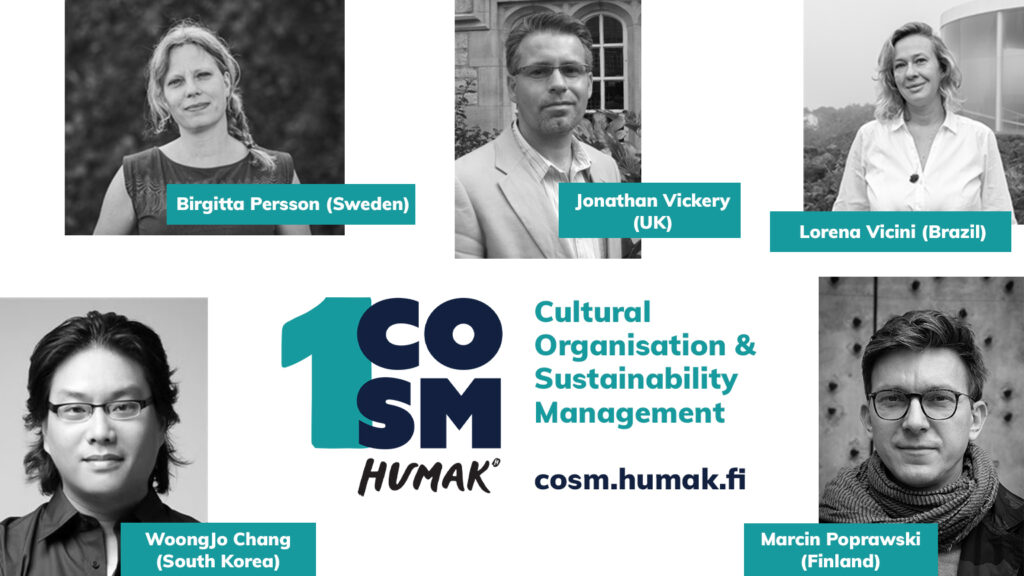
Birgitta Persson (Olivearte Cultural Agency, Lund, Sweden)
Jonathan Vickery (University of Warwick, UK)
WoongJo Chang (Hongik University, Seoul, South Korea)
Lorena Vicini (Instituto Inhotim, Brazil)
Host lecturer:
Marcin Poprawski (Humak University of Applied Sciences, Helsinki, Finland)
Content
- Sustainability, Culture and Arts Management – the panoramic view
- Cultural Organisations and Sustainability Values, Symbols and Narrations: keywords and concepts
- Sustainability Values’ oriented Organisational Cultures in workplaces focused on Arts, Cultural Heritage and Creative practice
- Organisational practices of undoing the unsustainable and the role of the leader
- The Macro-level of Sustainability and Cultural Management – balanced Cultural Policies.
- Sustainable Cultural Ecosystems in practice
- Sustainability, Aesthetic Values and Creative Processes
Objectives
Students are aware of the essential questions, dilemmas, and content related to sustainability issues in cultural management. They can recognize unsustainable practices in cultural production and cultural management activities. The course is a safe space for questioning the answers and providing solutions regarding cultural organizations and cultural professionals’ roles in balancing their ecosystems. Participants of the course understand the spectrum of sustainability related challenges for cultural organizations.
The course goal is to activate different streams of students’ activity regarding cultural management & sustainability values: interaction, cooperation, reflection, written argumentation and dialogue in conversation. The course is a safe space for questioning the answers and providing solutions regarding cultural professionals’ role in balancing their ecosystems.
After completion of the course the participant:
- can recognize sustainability related challenges and unsustainable practices in cultural organisations
- can deliver to the cultural organization some practical solutions that applies her/his knowledge on sustainability related issues,
- can propose sustainability values-oriented narrations adapted to creative, cultural, art or heritage organization
- can provide examples, cases and sustainability-oriented solutions from international and cross-disciplinary perspective on sustainability values applies to cultural, creative, heritage and art organization of different size and type
- can propose elements of cultural policies and strategies aimed at sustainability values applied to cultural production activities and cultural ecosystems cooperative initiatives.
- can share the knowledge on relations’ complexity of creative practices, aesthetics, and sustainability values
- can plan the application of the course content on culture & sustainability values to her/his professional organizational environment
Evaluation
1-5 Finnish grading scale; assignment formats: groupwork, readings & discussion sessions, short essay, individual application plan of the course content;
COSM 1 schedule in the Autumn 2023 (6th ed.)
- 12.9.2023 hybrid session: on the campus classroom in Helsinki (Humak UAS, Ilkantie 4) 13:00 – 17:00 EET (+ online broadcast, interactive session – recorded)
- 26.9.2023 online session, 13:00 – 17:00 EET (interactive session – recorded)
- 10.10.2023 online session, 13:00 – 17:00 EET (interactive session – recorded)
- 24.10.2023 hybrid session: on the campus classroom in Helsinki (Humak UAS, Ilkantie 4) 13:00 – 17:00 EET (+ online broadcast, interactive session – recorded)
Experiences and testimonials of participants of the first edition of COSM 1 (Spring 2021):
I have been before in couple of sustainability development courses, but absolutely this gave me more knowledge of cultural and social aspects of sustainability. International experts of sustainability development from all over the world were a wonderful way to lead deep into sustainability subjects. The course gives a confident feeling of study with expertise and passion. The best in COSM 1 course were the inspirational speakers, their experience, and thoughts. There came up a pile of good books about sustainability and research materials to read. I got a lot of to think about the role of cultural work in sustainability. Tuula Hänninen
COSM course was one of the best I have participated. I learned and found some ways where and how I would like to develop my own possible career in the cultural sector. Course structure was efficient and comfortably inclusive. I really enjoyed it. I understood that my idea of sustainability might be in the heart of being a human and this course strengthened the concept about it. I know how to put what is learned into practice. Everyone, who intend to be in the managing position in the field of culture and art, should participate in this course. Sofia Palmio
The course provided a clear, in-depth, and demanding introduction to the sustainability theme. The subject was dealt extensively, that is, we went as far as the deepest waters. The speakers were well chosen and well prepared. There were interesting discussions. The assignments covered the academic part as well as one’s own creative work. I got a very clear picture of sustainability and its challenges not only in cultural production. I recommend prospective students to choose this course. Salla Raunio
This course was just what I hoped but did not expect. All my expectations were filled. The best of this course was all inspiring visitors. I felt so privilege to hear leading experts of sustainability development from over the world. The way the course was facilitated is very encouraging, polite, and inspirational. The courses support each other well and are connected. anon.
The lecture of Birgitta was the concrete that I needed! I had found the base to build on. I stopped to struggle, I turned back and grasped to my simple thoughts of what is sustainability. There it was, everything depends on how we treat and tolerate each other, how we listen, and do we hear at all? It is about our everyday life! How we live our lives and how willing we are to make the necessary changes? We as artists, managers, producers are in the key role in influencing the change inside of every individual. In my profession I can be the prime operator to change. By creating new stories to tell, new narratives, by developing new forms of interaction and new horizons to reach, I can direct all these individual minds towards a common goal and give the silent and forgotten voices a tone. Mayreth Wolff
I would like to point out that COSM 1 has indeed led me to seeing sustainable development in a different way, we should acknowledge sustainability is a concept of community-based thinking. Environmental, Social and Economic issues can be addressed and integrated in multiple ways and indeed we should keep this process open and exploratory. Lena Hüttl
COSM 1 biggest learning was to focus on good management and leadership that improves our wellbeing and functioning at work. Jiri Ahonen
I have been thinking a lot about a sustainability viewpoint in everyday life and especially in cultural productions while studying cultural management for three years now. Gladly for me we’ve got a new lecture and started this COSM. I got exited, because I would really like to be a wise producer when it comes to sustainable development. I do not want to produce anything which is unnecessarily heavy for the environment or to the organization I am working at. I appreciate the values, great work atmosphere and clear aims. And that is why I am glad I took this course; I learned a lot about the sustainability in organizations and in different kind of fields in cultural sector. I think that there were a lot of great material in the course contents! Sustainable leadership is something which I am going to carry on as a term on my future work paths. Tessa Ylinen
I really liked this course and webinars and all guest lecturers, speeches, interactions, and exercises. It was inspirational to hear guest lecturers’ examples and knowledge about these matters. Same was to see all the tandem videos. I really like watching them and wanted to give at least a comment for every tandem. All webinars and materials and answers to our questions were great. This course was full of knowledge, and I will use information with my future projects, with my own manager duties, I will put my efforts to do it with sustainability! Leena Vanhamäki
All in all, COSM taught me a lot of different sustainability valued aspects of thinking. Hopefully these thoughts will help me to be a better – and more sustainable cultural manager. Jussi Artiola
I think that this course was a great wholeness. There was a lot of (useful) information. I learned a lot and it was great to have such a versatile group of students. I think that there was a good number of assignments and the quality of those were suitable. anon.
Past editions guest lecturers:
